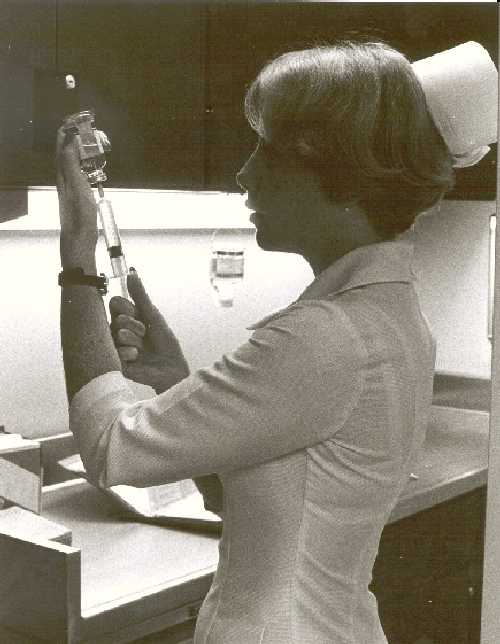CNA and STNA Study Guide
May 24, 2011 by Rn2b
Filed under Certified Nursing Assistant (CNA), Nursing Books, Testing and Exam Help
A Certified Nursing Assistant (CNA) assists with patients under the guidance of a Registered Nurse or Licensed Practical Nurse. They are also  considered a Patient Care Assistant, Stated Tested Nurse, and Nursing Assistant, depending on the area.
considered a Patient Care Assistant, Stated Tested Nurse, and Nursing Assistant, depending on the area.
The CNA test is best studied through the use of the class textbooks and through practice, practice, practice.
The basic advice given by nurses who passes the CNA exam gives these tips:
1) knock
2) introduce yourself/identify the patient
3) wash hands
4) explain the procedure
5) gather equipment
6) pull curtain
7) perform and talk
Good luck on your test!
Reasons a Nurse Needs to Get Their Own Insurance on Malpractice Liability
August 29, 2009 by Rn2b
Filed under Becoming a Nurse, Certified Nursing Assistant (CNA), Featured Nurse News, General Nurse Information
Reasons a Nurse Needs to Get Their Own Insurance on Malpractice Liability
Do I need my own malpractice liability insurance if I am employed and my employer covers me?
This question is asked by many nursing practitioners who are worried about certain events which are unpredictable as they practice their profession. While there are many nurse practitioners who are covered by their own individual liability insurance, many are still not and because of this, they have to rely on their employer’s policy.
For number of reasons, patients can sue nurses. This can bring embarrassment and damage to one’s perfect reputation. The policy of the employer may cover an individual, but this has a limitation. You have to remember that your employer’s insurance is availed for their own advantage and specific needs and that is why they have to prioritize themselves before you.
 You may even be assured by the human resources department that you do not need to avail your own liability insurance but as a matter of fact, they don’t inform you that what they want is for you to be represented by their lawyers. An outside representation of attorneys is out of the question since their best interest will not be put first and given the most important priority. To have your own insurance will be of assurance to you that you will be represented by a lawyer when you come across a certain situation and this lawyer will be dealing with only protecting your needs and interest.
You may even be assured by the human resources department that you do not need to avail your own liability insurance but as a matter of fact, they don’t inform you that what they want is for you to be represented by their lawyers. An outside representation of attorneys is out of the question since their best interest will not be put first and given the most important priority. To have your own insurance will be of assurance to you that you will be represented by a lawyer when you come across a certain situation and this lawyer will be dealing with only protecting your needs and interest.
The ethics of not being insured or not having enough insurance is a burden heavily carried on the shoulders of many clinicians. If you accidentally make a mistake and someone is harmed, will you feel responsible for compensating the patient?
Policies for malpractice insurance have their certain limits and coverage. Let’s say that you as a worker are covered by your employer’s own insurance, other coworkers of yours who are employed in the same company probably share your insurance limits which is under similar policy and if you and your coworkers are included in a suit, the expenses could be more than what the insurance policy will cover and that means that you have to spend your own money for the excess costs!
Every nurse practitioner will have to encounter different risks and premiums. One should do a risk-benefit analysis and get as much coverage that you can afford, but it is advisable to get no less than $1 million per occurrence. If your employer’s policy has limits which are below $1 million, it is strongly suggested for you to purchase your own policy for additional coverage.
Here is a list of some of the important advantages of having one’s own policy:
• The nurse practitioner will be provided with his or her own legal counsel all expenses covered.
• Depending on the terms of the policy the nurse practitioner will be covered for incidents that occur out of the employment.
• One can also purchase limits that may be higher than the employer’s.
• Lastly, if the nursing practitioner purchases an occurrence policy, he or she will be covered when he or she leaves the employer’s practice, and need not purchase a tail.
Make no mistake about getting your own malpractice liability insurance. I tell you, it’s for your own good.
Everything You Need to Know About the Certified Nurse Educator Examination
August 29, 2009 by Rn2b
Filed under Becoming a Nurse, Certified Nursing Assistant (CNA), Featured Nurse News, General Nurse Information, Nursing Books, Testing and Exam Help
Everything You Need to Know About the Certified Nurse Educator Examination
The National League for Nursing created the Certified Nurse Educator Examination as a specialty certification in 2005. It is a credentialing tool for nurses who are have masters and doctoral degree nurse educators. About 1600 currently possess this coveted credential, the rate of passers for the exam is 85%.
Here are the eligibility criteria for initial certification which should be met at the time of application:
For option A, all three of these criteria must be met:

Everything You Need to Know About the Certified Nurse Educator Examination
• The person must be an active registered nurse as of the moment in the United States
• One should have either a master’s or doctoral nursing degree majoring or emphasizing education for nurses and 9 or more credit hours of graduate level education subjects
• One should also have a two year or more of full-time employment as an academic faculty in schools and this must be within the past five years for eligibility to take the exam.
For option B, these criteria should be met as well:
• Licensure (One should be an active nurse, registered and with a license eligible in the United States)
• Education (A master’s or if possible, doctorate in nursing with a major which emphasizes a role different from nursing education is necessary)
• Experience of 4 years or more employed full time (this is determined by the institution where the person works) in the academic faculty role within the past five years.
The CNE exam does not involve computer-adaptive test like the NCLEX rather, it is a standard multiple-choice assessment in electronic format which is entirely computer-based. The test consists of 150 multiple choice questions and has a time limit of 3 hours. The exam costs about $375 for NLN member and $475 for those who are nonmembers. These examination cost can be reimbursed by some colleges and universities.
As for the result of the exam, the computer displays individual test scores (whether the examinee passed or not) as soon as candidates are finished with the certification exam so there is no fretful waiting for results.
Months before the exam, one should be able to start refreshing and reviewing for the certification test. There are many primer and reviewer booklets and guides that can be purchased in bookstores or other shops in the internet. The National League or Nurses also recommended reviewing of the following materials:
• The test blue print which will help one to understand how each content area is weighted, and to review the percentage of questions that pertain to each area.
• The recommended reference list which gives the references specific to each of the content areas.
• The Sample questions on the candidate handbook
Reviewing for the Certified Nurse Educator Exam is essential and self-assessment examination booklets are invaluable tools in preparing for the CNE examination. Likewise, reviewing the helpful handbooks used during master’s coursework and other nursing textbooks should also be helpful in preparing for the exam.
There are many benefits of CNE certification for the nurse educator and most important among these is becoming highly qualified and competitive in very tight job market.

